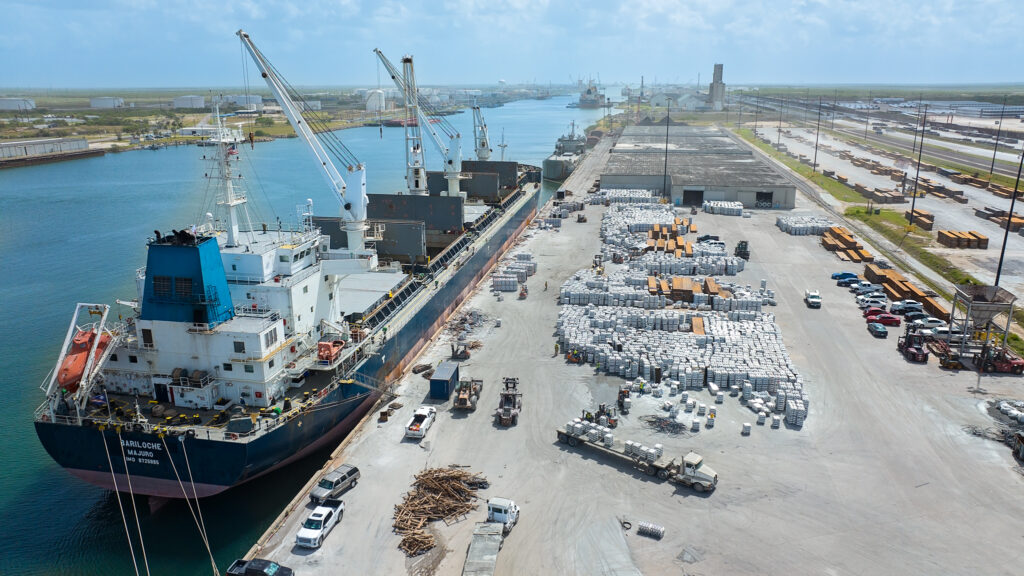- South Texas Students Meet Accordion Music Icons Los Tigres Del Norte In Edinburg Thanks To Khs America/Hohner Alianza Académica Initiative
- Fragile Planet Offers a Nighttime Wildlife Experience
- Falcons Soccer Off & Running
- Cameron County Receives Funds to Improve Two Parks
- Falcons Complete First Half of 32-6A
- School District to Help out Victims of California Wildfires
- Sand Castle Days Continued Despite Unexpected Weather
- Ready for District
- Discussion of Garbage Dumpster Rates, Agreements Between State & City on Highway Regulations, and More
- 31st Annual Shrimp Cook-Off is Right Around the Corner
Port of Brownsville Climbs to Top 50 Ranking for Cargo Movement in U.S.
- Updated: August 10, 2024

BROWNSVILLE, Texas — May 22, 2024 —The Port of Brownsville’s record-breaking streak continues as it rose to 50th position in the nation among 150 maritime ports for the movement of waterborne cargo, according to the U.S. Army Corps of Engineers 2022 Annual Report.
Throughout 2022, the port’s waterways handled 9.1 million tons of cargo marking an increase from 2021’s 8.9 million tons. The new numbers pushed the port from the 55th position to 50th on the list.
This upward trend continued throughout 2023 as total cargo tonnage at the port rose to 17.8 million tons, up 17% from 15.2 million tons in 2022, according to unaudited reports for FY 2023. Waterborne cargo accounted for approximately 12.3 million tons while non-waterborne cargo totaled 5.5 million tons.
Leading commodities at the Port of Brownsville include steel, liquid bulk products, wind energy components, and a variety of aggregates. Traffic at the port recorded robust vessel activity in 2023 with 2,561 vessel calls, signaling a 46% increase from the previous year’s total of 1,754.
“Climbing to the 50th position of our nation’s top maritime ports is a major accomplishment. These larger cargo volumes mean big business for the region and the State of Texas,” said Interim Port Director and CEO William Dietrich. “As we anticipate continued growth, we are committed to enhancing our infrastructure and expanding future opportunities at the port.”
Strategically located at the intersection of key shipping lanes linking the United States and Mexico, the port has served as a vital gateway for international trade since it first opened in 1936.
Currently underway at the port, the Brazos Island Harbor Channel Improvement project will deepen the 17-mile-long Brownsville ship channel from 42 to 52 feet to accommodate larger vessels with heavier loads and enhance navigational safety. Also, the port’s 118-acre industrial business park, currently in its construction phase, is attracting diverse industries strengthening its commitment to bring good-paying jobs to the region.
Furthermore, in progress is Rio Grande LNG’s 984-acre facility at the port. The development entails the liquefaction of natural gas for export to international markets, promising significant economic benefits for the region, state, and nation. The construction of this facility alone is expected to create over 5,000 jobs in the area and is projected to provide an increase in gross domestic product, estimated to reach $6 billion in Cameron County, $23 billion in Texas, and up to $35 billion across the United States, according to the company.
About the Port of Brownsville
The Port of Brownsville is a premier ship recycling and ship building port in the United States and a rising player in the energy sector, with Rio Grande LNG’s facility under construction, marking the largest capital investment in the state. As the only deep-water seaport directly on the U.S.-Mexico border, the Port of Brownsville spans 40,000 acres, making it the largest land-owning public port authority in the country. It transships more steel into Mexico than any other U.S. port.
Serving as the major multimodal transportation hub for the Rio Grande Valley and northern Mexico, the Port of Brownsville supports significant investment opportunities and job creation. Port activities contribute over $2 billion to the regional economy, $3 billion to the Texas economy, and result in more than 51,000 jobs statewide.
For more information, visit www.portofbrownsville.com.



